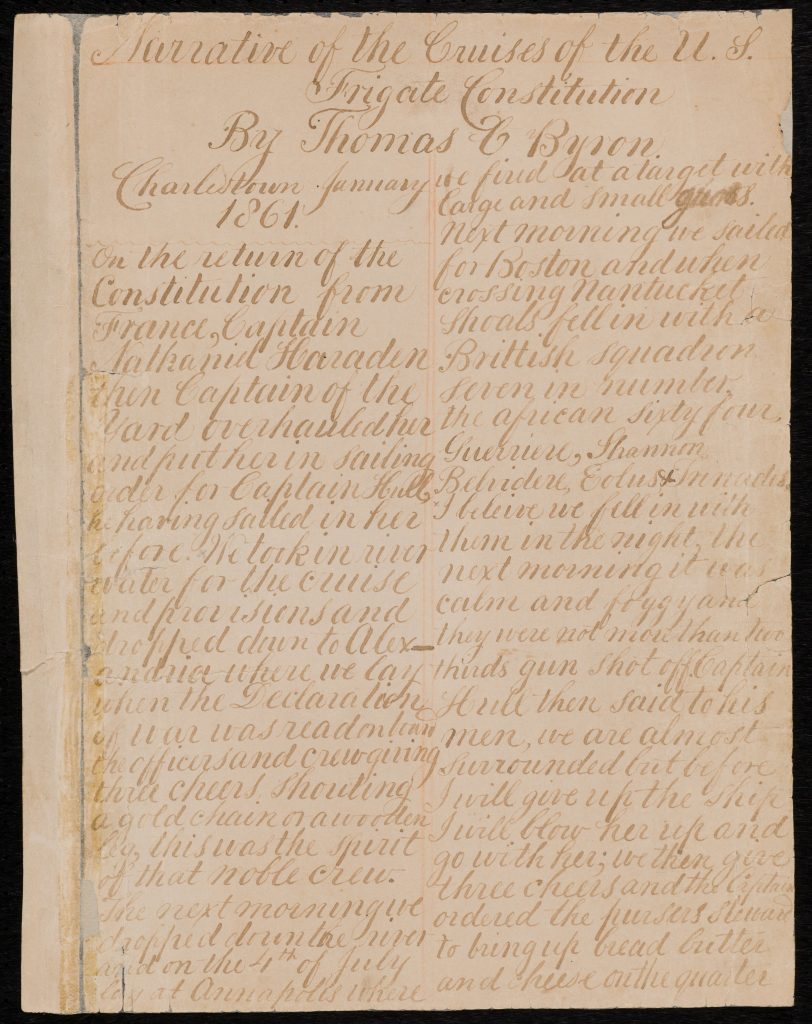Ship's Crew
Thomas C. Byron
Rank(s): Marine Musician
Dates of Service: 1812 - 1815
Birth Date: c.1785
Death Date: 2/27/1861
Early Life
According to his enlistment papers, Thomas Byron was born in Baltimore, Maryland about 1785. His death record, however, claims that he was born in England about 1793. He was the son of Josiah and Mary Byron.
Byron enlisted in the Marine Corps as a private for five years on July 24, 1811. When Byron joined up, the Marines assigned the musically skilled soldier to his regiment’s band. Once war was declared in 1812, he volunteered to serve aboard Constitution. Most frigates carried two fifers and two drummers, but Byron was the only fifer on the ship. Not content to play his fife while the battle raged, Byron claimed to have fired a gun during “the early engagements” and supposedly received thanks from the commander for his efforts.
The ship’s “musicks,” as the fifers and drummers were called, typically called the crew to dinner and to battle stations. Above the deafening roar and confusion of battle, the sounds of the fife and drum conveyed orders to the sailors. The unpredictable nature of life aboard a war ship meant the musicians were prepared to play at a moment’s notice.
Life aboard Constitution could be dangerous and difficult even when not engaged in battle. In his narrative Byron describes a voyage when fresh water ran scarce. The ship couldn’t resupply in port for fear of being blockaded, and their six month supply of water and food were diminished by prisoners taken aboard.
“Now I will state our sufferings on the night we crossed the equinoctial line, that night all hands came near dying for want of water. A number were dipping up with tin pots the water that had fallen from a small shower into the boats on deck and mixed with the salt water that had flew over the side into it also old tobacco chews which the men had thrown into the boats and they had to drink it. About daylight it began to rain as it generally does in crossing the line and we were very glad but was not allowed to catch a drop for our messes untill it was all over, but had to get up casks and spread sails over the deck and fill them and strike them down into the hole. This was the way we had to live. Every shower the men would run with their pots and cans and stop the scupper holes up to catch the water that fell on deck, dirty as it was they had to use it and sometimes it was so tarry that they could hardly swallow it others running & catching a little here and there upon the painted hammock or some other place which would be so painty that it was almost impossible to use it.”
Battles and Engagements
Byron shared in the crew’s prize money for participating in the battles against HMS Guerriere, HMS Java, HMS Cyane and HMS Levant.
Byron wrote a narrative of his life aboard Constitution, and in it describes his opinion of his shipmates:
“There was not a Ship we took that was half a nug for old Ironsides and she could take another like her in one hour after as she never lost any of her spars and but about 12 or 15 men in any fight she had, and her crew was the smartest and her men the most capable ever known in the annals of history. Many of her men had been brought up on the sea, some had been masters of vessels both as sailors and marines and they were as united as brothers.”
In the years after the War of 1812, Byron worked as a stevedore, unloading ships along Boston’s waterfront. Byron claimed that as the ship’s sole fifer, he suffered injury to his lungs from the extra physical effort and stress. He applied for an invalid pension, but we have no record that he received it. The historian Benson J. Lossing visited Byron in Charlestown in 1860. He said, “Mr. Byron was lively and fluent in conversation, and entertained us for an hour with grave and humorous narratives of his experience in the service.” He died of “lung fever” on February 27, 1861.
Crew ID
1541
